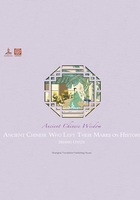
陆游 Lù Yóu (1125-1210)
The Patriot of Poetry
Born during the turbulent years of the invasion by troops of the Jin Kingdom and the collapse of the Northern Song Dynasty (960-1127), Lu You received patriotic education in the family from when he was a child. When grown up, he never gave up his dream to help rejuvenate his nation and reunite the country under the Song Dynasty.
Lu was a highly talented student. When he was 12, he could already write exceptionally well. He also mastered the skill of sword fighting and became steeped in war strategy. When he was 19, he sat for imperial civil service examinations for the first time, but failed. Ten years later, he retook the exams in the region of Lin’an (today’s Hangzhou in Zhejiang Province), the capital of Southern Song Dynasty (1127-1279). This time, he achieved the highest score.
However, due to the fact that he was in competition with the grandson of Qin Hui, a notorious venal official and later a traitor of the imperial court, Lu was arbitrarily excluded from the national examinations.
It was not until after Qin Hui’s death, Lu began his official career. However, his unremitting pursuit of the goal of driving out the invaders and reestablishing the Song Dynasty’s rule in the northern part of the country went against the indifferent attitude of most pathetic officials in the court at that time. As a result, his official career was short-lived.
After he was dismissed, Lu spent much of his time drinking and writing poems and became one of the most prolific writers in the history of Chinese literature and more than 9,000 of his poems have been preserved. His free-flowing and majestic poems are imbued with his passionate patriotism.
Even in his late years, he still didn’t give up his aspiration of reuniting the country. In “To My Son,” one of Lu’s most notable poems, he writes:
“I know nothing means anything after my
death,
My only regret is that I couldn’t be there to
see the country reunited.
So when the emperor’s armies recapture
the northern land,

Don’t forget to tell your father at the usual
home sacrifice.”
Today, many people know this poet also because of his romance with his cousin Tang Wan and the heartbreaking poems he wrote for his first love.
Lu and Tang grew up together and later they fell deeply in love with each other and got married when Lu was 20. They didn’t have any children and Lu’s mother didn’t want this marriage to continue. So, she forced Lu to divorce his cousin. Despite the fact that he was so in love with Tang, Lu, as a pious son, had to obey his mother’s order at that time. After their reluctant divorce, Tang married another man.
Ten years later, Lu came across Tang and her husband in the Shen’s Garden. Both of them became so emotional that Lu immediately wrote down a poem entitled “Phoenix Hairpin” on a wall to express his sad feelings. Tang, herself a famous poet, also wrote a poem in the same style to express her passion for her first love. Tang felt so depressed that she died one year after their encounter in the Shen’s Garden.
In his poem “Phoenix Hairpin,” Lu expressed his gut-wrenching sorrow for being separated from his true love. And the last three lines in the poem are widely deemed as the eternal tearjerker:
“Peach flowers fall, the ponds and pavilions
are deserted.
Though our vows remain true,
our loveletters can no longer get through.
It’s over, over, over!”